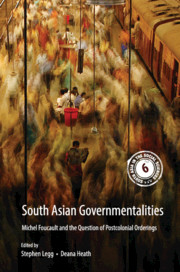2 - Governmentality in the East
from Introductions
Published online by Cambridge University Press: 28 October 2018
Summary
Foucault's concept (I suppose we may call it that) of governmentality, as elaborated chiefly in his lecture series Security, Territory, Population, has a clear European genealogy, traceable through writings since the sixteenth century in Italian, French, English and German and in state practices in various Western European countries (Foucault, 2009).What happens when we try to trace something similar in the process of emergence of the modern state in non-European parts of the world? Some attempts have been made in this direction by historians of South Asia, usefully summarised recently by Uma Kalpagam (2014). In this chapter, I propose to look at some of their findings. They raise interesting questions about the varying trajectories of the modern state in different places. They also show the productive possibilities of thinking with and against Foucault.
It will be useful to divide the discussion, albeit a little schematically, into three historical periods. The first is that of British colonial administration in India spanning the entire nineteenth century. The second is the period of the nationalist challenge to British rule in the twentieth century, sporadic attempts by colonial rulers to introduce liberal governmentality and the inauguration in the 1950s of a postcolonial liberal constitutional order formally grounded in popular sovereignty. The third period is the contemporary one, in which governmentality has itself produced forms of popular politics of claimmaking, agitation and resistance. This schematic periodisation is not to suggest that colonial sovereignty in the nineteenth century was superseded by a period of liberal governmentality in the twentieth to culminate in popular politics in our contemporary present. Rather, I hope to show that the exercise of sovereign power prevailed in the form of a set of administrative tactics throughout the entire period, just as liberal governmentality too became available as a tactic of power from the early nineteenth century. The varying strategic combinations of the two, giving rise, in certain instances, even to an abnormal political rationality, are what define each historical period, calling for specific historical explanation.
- Type
- Chapter
- Information
- South Asian GovernmentalitiesMichel Foucault and the Question of Postcolonial Orderings, pp. 37 - 57Publisher: Cambridge University PressPrint publication year: 2018
- 4
- Cited by

